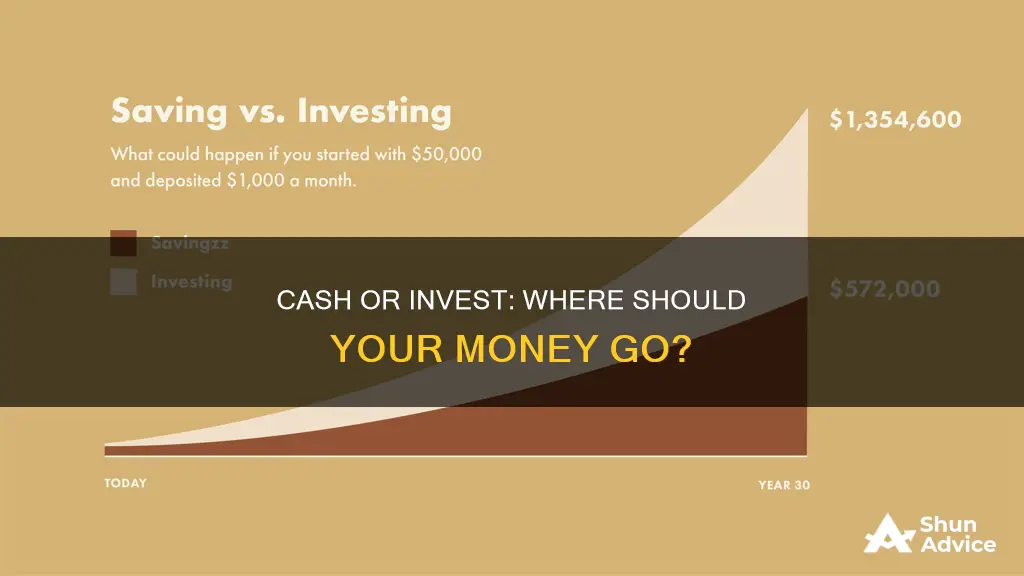
Holding cash and investing both have their pros and cons. Deciding whether to put your money into a savings account or invest in the stock market depends on your financial goals, risk tolerance, and market conditions. Holding cash provides easy access to funds and low volatility, while investing offers higher potential returns but carries more risk. Let's explore the key considerations for each option.
| Characteristics | Values |
|---|---|
| Liquidity | Cash is highly liquid and easily accessible. |
| Investment Risk | Cash held in a bank or savings account carries no investment risk. |
| Return on Investment | Cash investments have low returns compared to stocks and other investments. |
| Volatility | Cash is not subject to market volatility. |
| Inflation Risk | Cash is vulnerable to inflation, which can erode its purchasing power over time. |
| Opportunity Cost | Holding cash may result in missed opportunities for higher returns from other investments. |
| Flexibility | Cash provides flexibility in times of financial stress or unexpected expenses. |
| Control | Cash offers complete control over your funds, which can be easily reviewed and accessed. |
| Investment Horizon | Cash is suitable for short-term financial goals, while investments are typically recommended for longer time horizons. |
| Investment Type | Cash is suitable for conservative investors, while stocks and other investments cater to those with higher risk tolerance. |
What You'll Learn

Weigh up the pros and cons of holding cash in the short term
Holding cash in the short term has its pros and cons. One benefit is that your money is always available. For example, if an unexpected expense arises, you will have the funds to cover it without having to rely on credit cards or personal loans, which often come with high interest rates. Having cash on hand also allows you to take advantage of unexpected investment opportunities.
However, the downside of holding cash in the short term is that your money does not grow. Cash hidden in a safe or under a mattress will not earn any interest or appreciate in value. Instead, due to inflation, your cash will lose purchasing power over time.
Another disadvantage of holding cash is the opportunity cost. By keeping your money in cash, you may be forgoing potentially better investments that could generate significant returns. This is known as "cash drag" in a portfolio.
To mitigate the effects of inflation and potentially offset the opportunity cost, you can consider holding cash in high-yield savings accounts or cash equivalents, such as money market accounts or mutual funds. These types of investments offer modest returns that can help protect your cash from losing too much value due to inflation.
In summary, while holding cash in the short term provides easy access to funds and flexibility, it also comes with the trade-off of limited growth and the potential erosion of purchasing power due to inflation. It is important to weigh these factors when deciding how much cash to keep on hand and how much to invest for the short term.
Investing Activities: Do Cash Flows Stay Positive?
You may want to see also

Understand the risks and rewards of investing in bonds
Bonds are a type of financial investment that can be a good option for those looking to protect their savings from a volatile market. They are essentially an IOU – you lend money to a borrower, and in return, they promise to repay you, plus interest, at a set date.
There are several types of bonds, each with varying degrees of risk:
- Corporate bonds are issued by corporations seeking to raise capital. They usually offer the highest yield but also carry the highest risk.
- Municipal bonds, or 'munis', are issued by state or local governments. They are often exempt from federal and state taxes, which makes them attractive to investors in high tax brackets.
- Government bonds are issued by the US Treasury or other federal agencies. Treasury bonds are considered the safest of debt instruments and are backed by the full faith and credit of the US government.
Bonds are rated by major rating systems like Standard & Poor's and Moody's to indicate their risk level. The ratings are based on the likelihood that the bond issuer will default on their obligation to investors. The safest bonds are rated AAA by Standard & Poor's (or Aaa by Moody's), while riskier bonds that offer higher yields are often referred to as 'junk bonds'.
When deciding whether to invest in bonds, it's important to understand the risks and rewards compared to other investment options, such as holding cash. Here are some key points to consider:
- Interest rate risk: Bonds are sensitive to interest rate movements. When interest rates rise, bond prices fall, and you may lose money if you need to sell before the maturity date. On the other hand, when interest rates fall, bond prices rise, leading to capital gains for investors.
- Reinvestment risk: If interest rates fall, you will need to reinvest your money at a lower coupon rate, which may reduce your overall returns.
- Credit risk: There is a possibility that the bond issuer will be unable to make interest payments or repay the principal on the debt.
- Inflation risk: Over time, inflation can erode the purchasing power of fixed-rate investments like bonds.
- Default risk: If the bond issuer defaults, you may lose some or all of your investment.
- Tax implications: In the US, government bond interest payments are subject to federal taxes but are usually exempt from state taxes. Municipal bonds may also be exempt from federal and state taxes, making them a tax-efficient investment.
Despite these risks, bonds can offer several benefits:
- Diversification: Bonds can help diversify your portfolio, particularly during tough economic periods when stocks may take a hit.
- Regular income: Bonds provide consistent investment income in the form of interest payments, which can be attractive for investors seeking regular returns.
- Capital gains: Investing in bonds offers the potential for capital gains if you sell before maturity and interest rates have fallen.
- Low risk: Compared to stocks, bonds are generally considered low-risk investments, especially government bonds issued by developed countries.
In summary, investing in bonds carries more risk than holding cash but also offers the potential for higher returns and diversification benefits. When deciding whether to invest in bonds, it's important to consider your investment goals, risk tolerance, and current market conditions.
Invest to Conceal Cash: Strategies for Discreet Money Management
You may want to see also

Consider the opportunity cost of holding cash
Holding cash can be a safe option, especially when financial markets are volatile or uncertain. However, it is essential to consider the opportunity cost of doing so, as it can impact your overall financial strategy and returns.
Opportunity cost refers to the potential benefits that are missed out on when one alternative is chosen over another. In the context of holding cash versus investing, the opportunity cost is the return on investment that could have been achieved by investing in assets such as stocks, bonds, or other vehicles, instead of keeping the money as cash. This cost can be significant, especially when considering the potential for long-term compound interest and the effects of inflation.
Holding cash provides easy access to funds and is generally considered low risk. However, it often generates little to no return, and the purchasing power of cash can decrease over time due to inflation. On the other hand, investing in assets such as stocks or real estate offers the potential for higher returns and can help maintain the purchasing power of your money.
For example, let's consider the opportunity cost of holding cash instead of investing in the stock market. Historical data shows that, over the long term, stocks have generally outperformed cash and other low-risk investments. From 1926 to 2020, large-cap stocks in the S&P 500 averaged annual returns of 10.2%, while long-term government bonds and Treasury Bills returned 5.5% and 3.3%, respectively. By choosing to hold cash instead of investing in stocks, an investor would have missed out on the potential for significantly higher returns.
Additionally, holding cash can impact your ability to take advantage of unexpected investment opportunities. If all your funds are tied up in cash, you may not be able to capitalise on attractive investment opportunities that arise.
To mitigate the opportunity cost of holding cash, individuals can maintain a balanced financial portfolio that includes both cash and investments. This allows for easy access to funds in case of emergencies or short-term needs, while also providing the potential for higher returns through investments. The allocation between cash and investments will depend on various factors, including an individual's risk tolerance, investment goals, and market conditions.
Cash Flow Analysis: Key to Investment Decision-Making
You may want to see also

Learn about reinvestment risk
Reinvestment risk refers to the possibility that an investor will be unable to reinvest cash flows received from an investment, such as coupon payments or interest, at a rate comparable to their current rate of return. This new rate is called the reinvestment rate.
For example, an investor buys a 10-year $100,000 Treasury note (T-note) with a 6% interest rate, expecting to earn $6,000 per year. However, at the end of the first year, interest rates fall to 4%. If the investor buys another bond with the $6,000 received, they would only receive $240 annually instead of $360. Moreover, if interest rates increase and they sell the note before its maturity date, they risk losing part of the principal.
Callable bonds are especially vulnerable to reinvestment risk because they are typically redeemed when interest rates decline.
Reinvestment risk can be mitigated by investing in non-callable bonds, zero-coupon instruments, long-term securities, bond ladders, and actively managed bond funds.
Zero-coupon bonds (Z-bonds) are the only type of fixed-income security with no inherent investment risk since they issue no coupon payments throughout their lives.
Bonds with longer maturities may offer higher returns and less reinvestment risk than short-term investments when rates fall. Longer-maturity investment-grade bonds issued by companies with high credit ratings and governments have historically delivered higher returns than either short-term investments or stocks when the economy is slowing and interest rates are no longer rising.
By investing in bonds with maturities of between 3 and 10 years, or in a bond mutual fund or ETF, investors can avoid the risks posed by holding too much in short-term investments and potentially continue earning the desired level of return.
Investments and Cash Equivalents: What's the Real Difference?
You may want to see also

Compare cash with other assets in an inflationary environment
Holding cash in an inflationary environment can be challenging for businesses. Inflation reduces consumer spending and increases the cost of goods and services. This may force firms to hold more cash to better manage the uncertainties and risks associated with rising prices. However, holding cash during inflation can also prevent businesses from meeting their long-term goals.
Benefits of holding cash in an inflationary environment
Holding cash provides liquidity during uncertain times. It helps businesses navigate inflation by allowing them to meet short-term financial obligations like paying bills, salaries, and other expenses. It also helps them cover any unexpected costs or emergencies financially.
Additionally, the Federal Reserve typically fights inflation by increasing interest rates. By having cash on hand, businesses can pay off debts or make investments without borrowing money at high-interest rates. Holding more cash also allows businesses to take advantage of more investment opportunities in an inflationary environment.
Downsides of holding cash in an inflationary environment
If a business holds onto cash during periods of high inflation, it loses value more rapidly. Various assets, such as stocks, commodities, and equities, can match or outperform the inflation rate. Therefore, letting money sit idle during a recession means missing out on investing in productive assets that can generate cash flows over time.
Over the long term, the value of cash decreases as inflation erodes its purchasing power. This makes it more expensive for businesses to purchase goods and services.
Other assets to consider during inflation
- Real estate: Property prices and rental income tend to rise with inflation. Real estate investments can be made directly or through real estate investment trusts (REITs) or specialized funds.
- Commodities: Commodities include raw materials and agricultural products like oil, copper, cotton, soybeans, and orange juice. Commodity prices tend to rise alongside the prices of finished products made from those commodities in inflationary environments.
- Inflation-indexed bonds: These offer a variable interest rate tied to the inflation rate. Treasury Inflation-Protected Securities (TIPS) are a popular option in the United States, pegged to the Consumer Price Index.
- Stocks: Stocks have a reasonable chance of keeping pace with inflation, especially those in the consumer staples sector, which can pass their rising input costs to customers.
- Leveraged loans: These are floating-rate instruments, meaning banks or lenders can raise the interest rate charged so that the return on investment keeps pace with inflation.
- Mortgage-backed securities (MBS) and collateralized debt obligations (CDOs): Investors do not own the debts themselves but invest in securities whose underlying assets are loans.
- Gold: Gold is often seen as a haven during inflation, causing its price to rise.
- Bonds: Bonds provide interest income that sometimes meets or exceeds the inflation rate. They also offer the potential for capital gains if bought at a discount.
While holding cash can provide liquidity and help avoid high-interest rates during inflation, it can also prevent businesses from meeting long-term goals due to missed investment opportunities and the loss of purchasing power. Therefore, businesses may need to balance holding enough cash to manage risks with investing in growth opportunities to stay competitive during inflation.
Cash Investments: Revenue or Not?
You may want to see also
Frequently asked questions
Holding cash gives you easy access to your money in case of emergencies or unexpected expenses. It also allows you to take advantage of any sudden investment opportunities that may arise.
The main drawback of holding cash is that it does not grow in value and is susceptible to inflation, causing it to lose purchasing power over time. Holding cash also carries an opportunity cost, as you may miss out on the potential higher returns of investing.
Holding cash can be a good option if you need immediate access to your funds in the near future or if you want to maintain complete control over your money. It can also be a good choice during times of high market volatility or economic uncertainty when investing may carry more risk.







